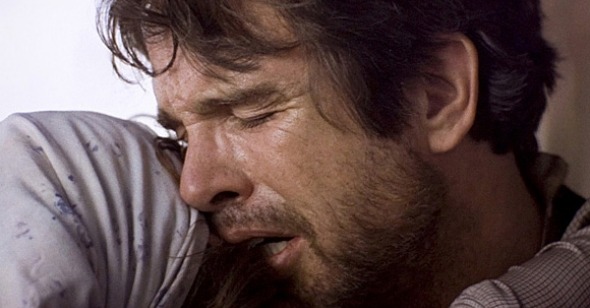Left Blank
By Keith Uhlich
Reds
Dir. Warren Beatty, U.S., Paramount Pictures, 1981
Interesting to consider that Reds very closely followed the debacle of Heaven’s Gate and was in gestation for a good many years prior (reports say that multihyphenate auteur Warren Beatty began shooting interviews with the film’s “witnesses” as far back as the mid-seventies). It’s as much a bloated work as Cimino’s, decidedly uncomfortable in its own skin (with master-class cinematographer Vittorio Storaro once more forced to visualize, as in Bertolucci’s The Conformist, his collaborator’s highly dubious sexual/historical whims), though it inhabits a quite fascinating and uneasy space, alternating in tone between Me Decade navel-gazing and empty Eighties excess. Best not to go into Reds expecting anything but the most superficial insights into its social movements of choice: early 20th-century America’s bohemian culture and the correspondent Bolshevik uprising in Russia. Beatty pitches everything at the same tenor, illustrating artistic and political discourse on both sides of the Atlantic as a series of perpetual, unintelligible shouting matches. The case could be made that he’s attempting immersion in distinct milieus, but for that to take, Reds would have to be something other than the Warren and Diane show.
“Profits.” That’s the first and only word out of journalist John Reed’s (Beatty) mouth at the Portland, Oregon, liberal club meeting that opens the film. And boy, does that turn on Diane Keaton’s sassy and defiant fellow writer Louise Bryant! Soon enough, they’re in Bryant’s apartment making (to paraphrase Pauline Kael) Zhivagoogly eyes at each other over midnight-to-morning cups of coffee: neurotic Annie Hall squaring off with smirk n’ smarm John McCabe about the price of Borscht in St. Petersburg. Memorize this scene well, because it’s repeated—with little variation—over the next three hours, crinkle-faced fighting followed quickly by chiaroscuro fucking, often with a cute and curious puppy dog thrown in for Asta-anthropomorphized reaction shots. A low-hanging chandelier replaces the comic canine when the duo travel to Russia, and it’s there that Beatty’s preference for dissociative tableaux reaches its Dovzhenko-lite apex in a frenzied sequence which cross-cuts between the October uprising and the reignition of the Reed/Bryant libido (ten days that shook the world, indeed!).
There’s a whole second part to go, of course, detailing Reed’s slow disillusionment with the increasingly dictatorial Communist movement. Suddenly, Reds the wacky romantic comedy (complete with a jaw-dropping kitchen-on-fire dinner scene better suited to Nora Ephron) morphs none-too-convincingly into Reds the globe-trotting tragic romance, and the eleventh-hour self-seriousness makes one long for the pleasures of the film’s Provincetown section, where Jack Nicholson effortlessly shows up Beatty as the always-tipsy playwright (and Bryant beau) Eugene O’Neill. Bryant’s ice-queen cometh flirtations with this moony, misbegotten milquetoast would have made an infinitely more interesting movie of its own, one that Beatty undercuts when O’Neill reappears for no other reason than to act as go-between, facilitating his former lover’s neva-happened trek across the Finland ice floes to rendezvous with Reed (off on an equally strange interlude at a Lean-cut Middle Eastern outpost) and, finally, to keep vigil at his deathbed.
Throughout, Beatty sprinkles a series of talking heads interviews with the above-mentioned “witnesses,” Reed and Bryant’s social circle compadres who are unfortunately denied any onscreen identifiers (and therefore leeched of their own identity) outside of a massive main credits scrawl. Only Henry Miller, no surprise, makes much of an impression, his observation that “there was as much fucking then as there is now” perhaps the only logical explanation for the existence of what amounts to little more than a left-leaning pretty boy’s distended, black book ramblings.
